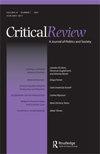黑格尔整体主义的三幅图景:神秘主义、工具主义、本质主义
IF 1.7
3区 社会学
Q4 POLITICAL SCIENCE
引用次数: 0
摘要
摘要在黑格尔《权利哲学》出版二百周年之际,我们可以对他的作品进行一系列激动人心的解读。在一种解释中,以约翰·弗里德里希·赫尔巴特(此处由弗雷德里克·贝瑟讨论)和卡尔·马克思(此处由雅各布·朗特里讨论)的反应为例,黑格尔的整体主义是浪漫主义或神秘主义形而上学的产物,该形而上学将思想的无形现实置于有形现实之上。在另一种解释中(由Roundtree本人和Darren Nah、Alan Patten和Paul Rosenberg提出),黑格尔的整体主义通过将个人自由或利益嵌入更大的文化或制度背景中,有助于维护个人自由或兴趣。第三种解释并不一定与第二种解释不兼容(弗雷德里克·诺伊豪斯、安吉莉卡·努佐和特里·平卡德的贡献就是例证),它将黑格尔的整体视为内在的理性,而不仅仅是因为它有助于其他目的。本文章由计算机程序翻译,如有差异,请以英文原文为准。
Three Pictures of Hegel’s Holism: Mystical, Instrumentalist, Intrinsicist
ABSTRACT The two-hundredth anniversary of the publication of Hegel’s Philosophy of Right allows us to provide an array of exciting interpretations of his work. In one interpretation, exemplified by the reactions of Johann Friedrich Herbart (discussed here by Frederick Beiser) and of Karl Marx (discussed here by Jacob Roundtree), Hegel’s holism is a product of a romantic or mystical metaphysics that prioritizes the invisible reality of the Idea over visible realities. In another interpretation (advanced here by Roundtree himself and by Darren Nah, Alan Patten, and Paul Rosenberg), Hegel’s holism is instrumental to preserving individual freedoms or interests by embedding them in a larger cultural or institutional context. A third interpretation, not necessarily incompatible with the second (and exemplified here by contributions from Frederick Neuhouser, Angelica Nuzzo, and Terry Pinkard), treats the Hegelian whole as rational intrinsically, not merely because it is instrumental to other ends.
求助全文
通过发布文献求助,成功后即可免费获取论文全文。
去求助
来源期刊

Critical Review
POLITICAL SCIENCE-
CiteScore
1.30
自引率
12.50%
发文量
17
期刊介绍:
Critical Review: A Journal of Politics and Society is a political-science journal dedicated to advancing political theory with an epistemological bent. Recurrent questions discussed in our pages include: How can political actors know what they need to know to effect positive social change? What are the sources of political actors’ beliefs? Are these sources reliable? Critical Review is the only journal in which the ideational determinants of political behavior are investigated empirically as well as being assessed for their normative implications. Thus, while normative political theorists are the main contributors to Critical Review, we also publish scholarship on the realities of public opinion, the media, technocratic decision making, ideological reasoning, and other empirical phenomena.
 求助内容:
求助内容: 应助结果提醒方式:
应助结果提醒方式:


